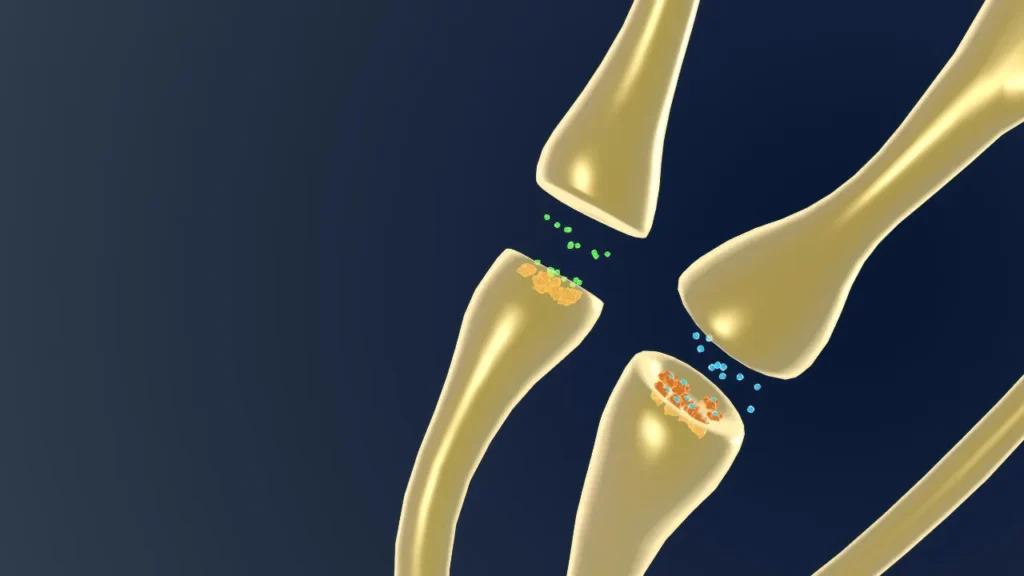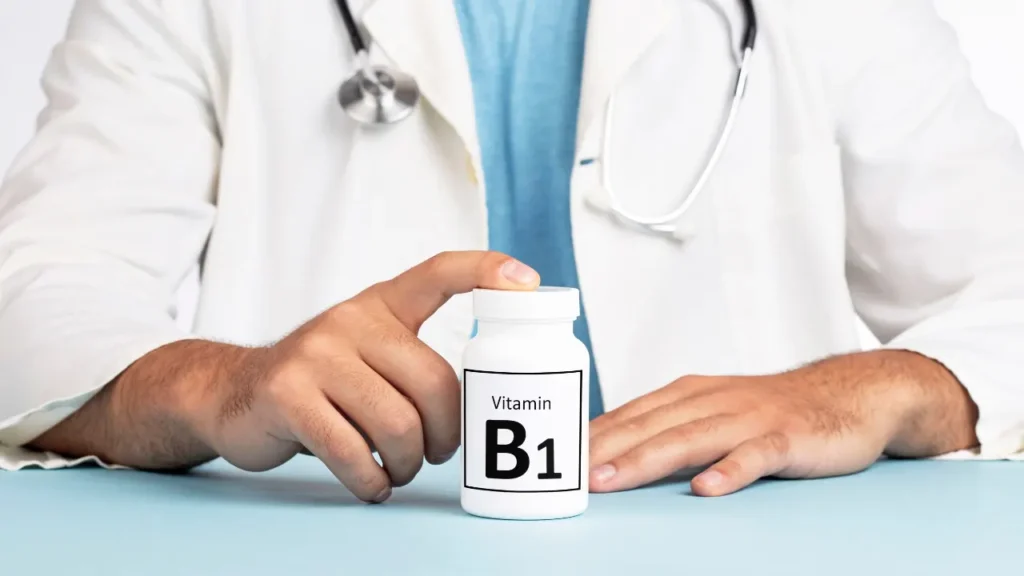Thiamine, also known as Vitamin B1, is a water-soluble vitamin. Thiamine plays a crucial role in energy metabolism and the normal functioning of the nervous system. Its discovery in the early 20th century marked a significant advancement in nutritional science, elucidating the link between diet and beriberi, a disease caused by Thiamine deficiency. This article explores the nature of Thiamine, its health benefits, optimal dosage, side effects, and potential substance interactions. The article also investigates its utility as a nootropic supplement.
You May Also Like:
Battle of the Brain Boosters: Brain MD Omega 3 Power vs. Kori Krill Oil Mind & Body
Tiratricol: Benefits, Dosage, Side Effects, Drug Interactions, and Other Important Information
Thiamine: Benefits, Dosage, Side Effects, Drug Interactions, and Other Important Information is an original (NootropicsPlanet) article.
Nature of Thiamine
Thiamine is vital to human health and cellular health maintenance. Because it is soluble in water, the body cannot store large amounts of it and must periodically receive it through food consumption. Fortified foods, meats, legumes, nuts, and whole grains are good dietary sources of Thiamine. Thiamine’s potential for treating deficits and promoting brain function is further highlighted by its activity in important metabolic pathways.
Health Benefits of Thiamine
For healthy nerves, energy metabolism, and cognitive function, Thiamine is essential. It facilitates the manufacture of neurotransmitters, including acetylcholine, which is necessary for muscle contraction and memory. A lack of Thiamine can cause neurological and psychological conditions, such as Wernicke-Korsakoff syndrome, which manifests as ataxia, disorientation, and memory issues. In order to prevent such disorders, support brain health, and even improve cognitive functions like alertness and focus, it is imperative that you ensure your diet includes enough intake of Thiamine.
Thiamine is a popular nootropic supplement because of its important function in neurotransmitter production and brain metabolism. Supplementing with Thiamine can prevent deficits and related neurological abnormalities, but there is little data to support its effectiveness in improving cognitive function in healthy adults. More conclusive research is needed in this area.
Nevertheless, some research indicates that Thiamine derivatives—like sulbutiamine—may be able to get through the blood-brain barrier more quickly than Thiamine itself, which may have advantages for cognition. The potential for these compounds to increase energy, memory, and focus is being investigated; nevertheless, until more is known about their long-term safety and efficacy, their usage should be treated cautiously.

Chemistry of Thiamine
Vitamin B1, or Thiamine, is distinguished by its distinct chemical structure, which consists of a thiazole ring and a pyrimidine ring joined by a methylene bridge. Its biological activity and function in human metabolism depend on this structure. There are other types of Thiamine, such as Thiamine hydrochloride and Thiamine mononitrate, which are stable and soluble in water and are frequently used in supplements and fortified foods.
Thiamine pyrophosphate (TPP), sometimes referred to as Thiamine diphosphate, is the active form of Thiamine in the body. The enzyme Thiamine pyrophosphokinase, which needs magnesium as a cofactor, catalyzes the conversion of Thiamine to TPP.
TPP functions as a cofactor for multiple enzymes implicated in the metabolism of carbohydrates, such as transketolase in the pentose phosphate route and pyruvate dehydrogenase and α-ketoglutarate dehydrogenase in the Krebs cycle. TPP plays key functions in the synthesis of ribose for the synthesis of nucleic acids, the regeneration of reduced glutathione, a crucial cellular antioxidant, and the conversion of glucose into energy (ATP).
Physiological Mechanism of Action
Thiamine plays a pivotal role in several key physiological processes, primarily through its coenzyme form, Thiamine pyrophosphate (TPP). Its mechanisms of action are fundamentally linked to energy metabolism, neurological function, and synthesis of neurotransmitters.
Energy Metabolism: TPP is crucial in the oxidative decarboxylation of pyruvate to acetyl-CoA, a vital step linking glycolysis to the Krebs cycle. This process is essential for ATP production in cells. TPP also participates in the oxidation of α-ketoglutarate to succinyl-CoA in the Krebs cycle, further contributing to energy production.
Neurological Function: Thiamine is essential for the nervous system’s functioning. It influences the creation and release of neurotransmitters, such as acetylcholine, which is involved in muscle contraction and memory. Thiamine deficiency can disrupt these processes, leading to conditions such as beriberi, characterized by muscle weakness, and Wernicke-Korsakoff syndrome, marked by severe neurological impairments.
Synthesis of Neurotransmitters: Beyond its role in energy metabolism, Thiamine is involved in the synthesis of neurotransmitters. It influences the pentose phosphate pathway, which generates precursors for nucleotide and amino acid synthesis. This pathway is also vital for maintaining the redox state of cells and contributes to the synthesis of neurotransmitters that regulate brain function.
Antioxidant Defense: Through its role in the pentose phosphate pathway, TPP contributes to the generation of NADPH, a critical reducing agent involved in antioxidant defense mechanisms. NADPH is essential for the regeneration of glutathione, one of the body’s primary antioxidants, which protects cells from oxidative damage.

Optimal Dosage of Thiamine
The recommended dietary allowance (RDA) for Thiamine varies by age, gender, and physiological status (e.g., pregnancy). For adults, the RDA is set at 1.2 mg/day for men and 1.1 mg/day for women. Higher doses, up to 50-100 mg/day, have been used therapeutically for certain conditions without adverse effects, suggesting a broad safety margin. However, optimal dosages for nootropic purposes have not been firmly established or agreed upon, as most research focuses on preventing or treating deficiency rather than enhancing cognitive function in non-deficient individuals.
Side Effects
When used as directed, thiamine is regarded as safe and well-tolerated. Very high doses—much more than the recommended daily allowance—have been linked to a small number of side effects, including allergic responses, mild irritation, and gastrointestinal distress. These cases are uncommon, though, and usually go away when the supplement is stopped.

Potential Substance Interactions
Certain chemicals may interact with Thiamine, influencing how well it is absorbed or used. For instance, drinking alcohol can raise the risk of Thiamine deficiency and severely hinder Thiamine absorption. In addition to increasing Thiamine excretion through the urine, several diuretics used to treat hypertension can also cause Thiamine levels to drop below ideal levels. It is vital for those of you who take these drugs or routinely drink alcohol to check their Thiamine levels and, if needed, think about supplementing.
Best Responsible Use
Adhering to recommended dietary allowances (RDA) and seeking advice from healthcare professionals on appropriate supplementation are the best ways to use Thiamine responsibly. This is especially important for populations at risk of deficiency or those of you looking to manage specific health conditions. It is imperative that anyone interested in using Thiamine or its derivatives as a nootropic grasp the current state of the science and approach supplementing with a dedication to safety. The safe use of Thiamine supplements involves several essential measures, including monitoring intake to prevent exceeding defined upper intake levels, being aware of potential interactions with other substances, and recognizing the signs of excess or deficiency.
Thiamine:
Conclusion
Thiamine (vitamin B1) is one of the essential vitamins for basic and overall health. It is a nootropic that is naturally occurring within many commonly eaten foods. A lack of this vitamin’s presence in your system can cause serious detriment. It is a supplement that is a strong candidate to be used to improve energy, metabolism, and brain function. Please proceed with cautious optimism as you explore your options and decisions to begin consuming Thiamine for its benefits.

References:
- “Thiamin – Vitamin B1.” Retrieved from: https://www.hsph.harvard.edu/nutritionsource/vitamin-b1/#:~:text=Thiamin%20(Thiamine)%2C%20or%20vitamin,thiamin%2Drich%20foods%20is%20needed
- “Thiamine (Vitamin B1) – Uses, Side Effects, and More.” Retrieved from: https://www.webmd.com/vitamins/ai/ingredientmono-965/Thiamine-vitamin-b1
- “What to know about thiamin (vitamin B1).” Retrieved from: https://www.medicalnewstoday.com/articles/219545
Important Note: The information contained in this article is for general informational purposes only, and should not be construed as health or medical advice, nor is it intended to diagnose, prevent, treat, or cure any disease or health condition. Before embarking on any diet, fitness regimen, or program of nutritional supplementation, it is advisable to consult your healthcare professional in order to determine its safety and probable efficacy in terms of your individual state of health.
Regarding Nutritional Supplements Or Other Non-Prescription Health Products: If any nutritional supplements or other non-prescription health products are mentioned in the foregoing article, any claims or statements made about them have not been evaluated by the U.S. Food and Drug Administration, and such nutritional supplements or other health products are not intended to diagnose, treat, cure, or prevent any disease.


